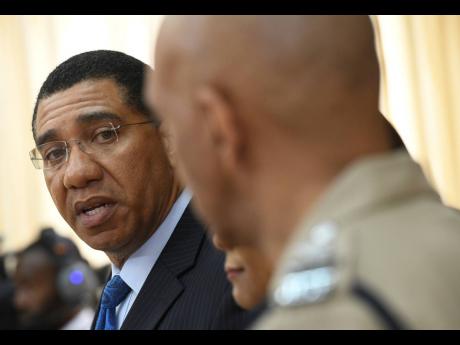SOE jitters - Debate on Clarendon, St Catherine security measure extension comes down to the wire
The state of emergency (SOE) credited with stemming the bloodletting in Clarendon and St Catherine in the last two weeks was preserved for another month after some last-minute talks to find common ground on the floor of the House of Representatives last night.
The security measure, which was imposed on September 5, was set to expire tomorrow and the Andrew Holness-led Government pressed for a 90-day extension.
“Since the implementation of the state of public emergency over the period September 5 to September 11 – that’s the first seven days of the operations – the rates of murders and shootings collectively have been reduced by 73 per cent,” Holness said as he sought to build the case for the three-month extension.
“That is from 15 murders to four murders when compared to the equivalent period,” he added, referencing the seven days preceding the SOE declaration.
But the parliamentary Opposition – citing reports of citizens rights being violated, economic losses to small business operators because of shortened opening hours, and what they described as the take-it-or-leave-it approach of the Government – signalled from early that would only agree to a 21-day extension.
“Over the time with this state of emergency matter, we have asked for data … . How many [criminal suspects] have been detained? How many gangs in the area? What’s the prospect of dismantling the gangs? What are the measures you [are] using? How many people charged? What are the objectives? What’s the progress? And yet we get nothing at all,” Opposition Leader Dr Peter Phillips lamented.
“All that happen is every time you come before the night before [the SOE expires] or the week before and say, ‘Just vote. Vote now’. Quite frankly, it seems to us the state of emergency is being used as a kind of symbolism just to give the impression that we seriously grappling with the problem.”
Phillips made it clear, too, that the Opposition would insist that the opening hours for small business operators be extended.
“The states or emergency are hurting the ordinary citizens who are crying out for protection from criminality,” he said.
The resolution authorising the extension of the SOE requires a two-thirds majority of the House of Representatives. With the Opposition unrelenting, both sides sought to reach a compromise.
After a debate that lasted more than three hours, Holness agreed to new opening hours of 7 a.m. to 10 p.m. for some companies, even as he acknowledged that it could stretch the resources of the security forces. He also agreed to try and push for the long-promised dialogue on crime with the Opposition and other stakeholders, but cautioned that a 21-day extension was insufficient.
This appeared to soften the Opposition, with Phillips agreeing to a 30-day extension. When the resolution was reworded and put to a vote, 45 lawmakers from both sides voted in favour of the one-month extension.
The enhanced security measure in Clarendon and St Catherine is set to expire on October 19.
A total of 948 persons have been murdered across Jamaica since the start of the year, according to figures revealed by Holness yesterday. This is a two per cent increase when compared with the corresponding period last year.
In addition, he says there have been 908 shootings. The gun is the main weapon used to commit murders across the country.

